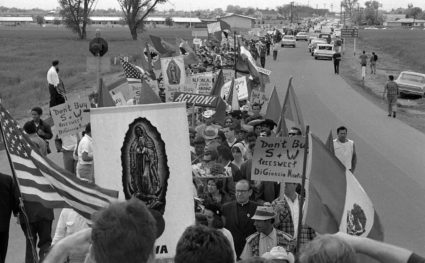
After four years of war in Ukraine, it may seem like there is little space for art or fun. But…

Our September 2020 pick for the PBS NewsHour-New York Times book club is Steven Greenhouse's "Beaten Down, Worked Up." Become a member of the Now Read This book club by joining our Facebook group, or by signing up to our newsletter. Learn more about the book club here.
When he started writing "Beaten Down, Worked Up," Steven Greenhouse had covered labor and workplace matters for two decades as a reporter with The New York Times. But even though he was already deeply immersed in the subject, Greenhouse also drew upon the work of a number of other labor historians, reporters and writers when doing research for his second book about American unions and workers.
"Beaten Down, Worked Up" provides an in-depth look at the rise and fall of worker power over the last century, but Greenhouse writes in the first pages of the book that it is "not a detailed, comprehensive history" of the American Labor movement. For that he recommends a number of other books — some that provide a sweeping history of labor in the U.S. and others that look at specific campaigns detailed in certain chapters of "Beaten Down, Worked Up."
On Labor Day, Greenhouse shared some of these recommendations with the PBS NewsHour, including biographies of key figures such as Walter Reuther and Cesar Chavez, as well as comprehensive histories of the American movement.
The most recent edition of this survey, published in 2017, provides "a detailed, comprehensive history of labor unions and workers in America, from colonial times to the present." Greenhouse wrote that this text "does an excellent job tying the political and economic context into what was happening with unions and workers."
In this book, Lichtenstein, a labor historian who directs the Center For the Study of Work, Labor and Democracy at the University of California-Santa Barbara, provides "a deep dive into the rise and decline of unions in the 20th century, with keen analysis of the interplay of labor with politics, economics, race and intellectual trends." He argues that the labor movement underwent a significant ideological and political transformation in the 1960s and 1970s, which left it unprepared to adapt to the Reagan and Clinton years.
Greenhouse points to Dray's vast 700-plus page book as "a highly readable history of labor in America." He added that Dray — who details both well-known organizing efforts as well as those that don't make it into every school curriculum — is "an excellent storyteller with an eye for lively detail."
Greenhouse calls this "a terrific biography of Walter Reuther, who many say was the greatest, most visionary labor leader of the 20th century."Greenhouse also wrote about the labor leader's central role in lifting up the American middle class in chapter seven of "Beaten Down, Worked Up." He called Lichtenstein's biography "an extraordinarily well-researched look at the U.A.W. leader."
In chapter nine of "Beaten Down, Worked Up," Greenhouse writes about the Professional Air Traffic Controllers Organization, which took on the Reagan administration, resulting in the firing of 11,000 workers and a loss for organized labor. Greenhouse called McCartin's work "a brilliantly researched and colorfully written book about the air traffic controllers' historic walk out in 1981 and their confrontation with Ronald Reagan."
As Greenhouse details in "Beaten Down, Worked Up," Martin Luther King, Jr., traveled to Memphis to participate in a sanitation workers strike prior to his assassination. In what would be his final speech, King promised the workers, "we, as a people, will get to the promised land." The author wrote that Honey's account of the strike is "an inspiring book about the heroic 1968 strike by Black sanitation workers in Memphis in which they demanded dignity and decent pay — and received vital, but costly backing from Dr. King."
"A well-researched, well-written biography of the great farmworker leader," Greenhouse said in recommending Pawel's biography of labor activist Cesar Chavez, who spent his life fighting to improve working conditions for farm workers in the U.S, including a strike against grape growers that lasted five years. "This book contains some big surprises as it takes a close look at Chavez's successes and shortcomings."
Sustain our coverage of culture, arts and literature.